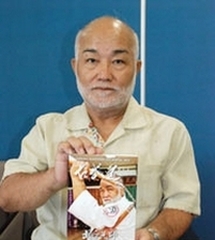Introducing traditional karate in English

Masahiro Nakamoto published the Kobudo-Buseisenshi to introduce the appeal of Okinawan karate to Okinawans living overseas. October 7, at the Ryukyu Shimpo office at Ameku, Naha City.
October 11, 2011 Ryukyu Shimpo
Masahiro Nakamoto, the president of the Okinawa Traditional Kobudo Preservation Society (Bunbukan), has published the Kobudo-Buseisenshi in English under the title Okinawa Traditional Old Martial Arts – The First Hanshi 10th Dan Okinawa Kobudo. Released to coincide with the 5th Worldwide Uchinanchu Festival, the book introduces the beginning of traditional karate suidi inherited from the Ryukyu Dynasty era, as well as giving information on the masters who created the foundation of karate in modern and contemporary times, and weapons used in kobudo such as the bou (6-foot staff) and the sai (trident).
Nakamoto said, “By publishing this English version, I would like to introduce our culture to second and third generation Okinawans living overseas who do not understand Japanese. I think that being aware of the legacy of traditional karate and kobudo will help give them pride and confidence about being Okinawan.”
The book was written by Nakamoto in 2009 and was translated into English by Miguel Da Luz, who is from France and has studied traditional karate in Okinawa. In the English version, Nakamoto includes a photograph of his students training in front of a traditional Okinawan tomb.
He said, “It is said that karate was kept secret in the Ryukyu era in attempt to keep it undiscovered by Satsuma Domain. These days of course, Okinawan karate attracts attention all around the world, but when we are practicing it, it is important not to forget its origin.” The book sells for 3150 yen in bookstores in Okinawa.
(English Translation by T&CT, Shinako Oyakawa and Mark Ealey)
Previous Article:World’s largest sea cucumber found in Iriomote
Next Article:Futenma roar appeal dismissed by Supreme Court without issuing a flight ban
[Similar Articles]
- Worldwide karate seminar held in Yomitan
- French practitioners hone their skills at karate’s birthplace in Okinawa
- Karate demonstration on Karate Day
- Survey conducted by Okinawa Prefecture finds 65% of people outside the island do not identify Okinawa as “The birthplace of Karate” – issues include lack of income and successors
- Finalists receive their medals at the 1st Okinawa International Karate Tournament
 Webcam(Kokusai Street)
Webcam(Kokusai Street)


